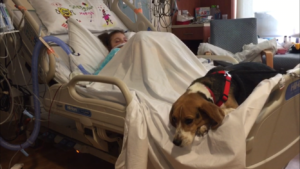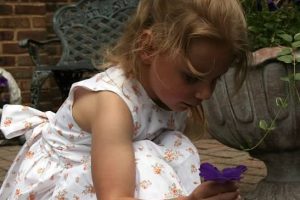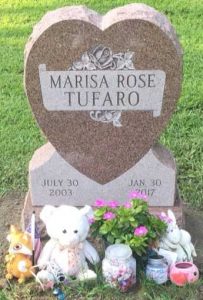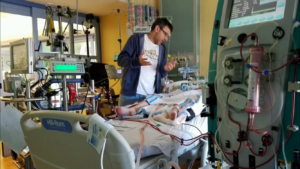Our nonprofit celebrates National Nurses Day with an open letter to the Pediatric Cardiac Intensive Care Unit nursing staff at New York-Presbyterian Morgan Stanley Children’s Hospital.
A little more than two years have passed since God’s will proved to be stronger than the collective will of the world’s most outstanding nursing staff.
A heart transplant, which was supposed to extend Marisa Tufaro’s life, tragically cut it short after a postoperative complication developed into a rare form of cancer to which she succumbed following a valiant battle.
 Born with a complex cardiac defect, Marisa, who survived six open-heart surgeries and life-threatening comorbidities prior to transplant, died on January 30, 2017 at the age of 13, nearly seven months after receiving an organ donor’s ineffable gift.
Born with a complex cardiac defect, Marisa, who survived six open-heart surgeries and life-threatening comorbidities prior to transplant, died on January 30, 2017 at the age of 13, nearly seven months after receiving an organ donor’s ineffable gift.
Marisa spent 161 of her last 214 days as a patient at New York-Presbyterian Morgan Stanley Children’s Hospital, where dozens of doctors and nurses, profoundly impacted by her remarkable courage and indomitable spirit, were reduced to tears after chemotherapy and radiation treatments failed to thwart the relentless onslaught of an aggressive disease that riddled her brain and body.
The compassionate medical team, which became Marisa’s second family, worked relentlessly around the clock for Marisa, whose strength was boundless and who approached life, despite all of her health issues, with unjaded innocence and a positive outlook.
As her condition precipitously declined, Marisa’s medical team went out of its way to ensure she was comfortable. Marisa was treated with the utmost dignity and respect. Nurses took remarkable steps to make her feel at home.
Upon learning her family’s Christmas Eve tradition was to take Marisa to Build-A-Bear, nurses brought that experience to Marisa’s bedside with two huge bags of white stuffing, a cute brown bear, a hospital scrubs outfit and a red heart to place inside the stuffed animal before it was stitched closed.
On New Year’s Eve, after Marisa took yet another turn for the worse, her parents stood at the stroke of midnight in front of the dark hospital room’s lone window, which provided a panoramic view of the scenic New York City skyline. As fireworks exploded in the distance with the Empire State Building providing a majestic backdrop, two nurses entered and stood silently alongside Marisa’s parents in a show of solidarity as all quietly wished upon a star for a miracle that never came because only God’s will is stronger than that of a collection of remarkable nurses.
 Less than a week later, and days before Marisa was placed on a ventilator, nurses arranged, with the approval of a hospital administrator, for Marisa’s dog, a beagle named Dunkin, to visit the room. Dunkin rested at the foot of Marisa’s bed.
Less than a week later, and days before Marisa was placed on a ventilator, nurses arranged, with the approval of a hospital administrator, for Marisa’s dog, a beagle named Dunkin, to visit the room. Dunkin rested at the foot of Marisa’s bed.
The following afternoon, one of the nurses presented Marisa with a fleece blanket featuring characters from Disney’s Moana, the last movie Marisa ever saw in a theater and one whose soundtrack Marisa played repeatedly toward the end of her too short life.
The last complete sentence Marisa ever uttered were words of gratitude to the nurse for that special blanket. “Thank you so much,” she said, essentially breathing each syllable in a barely audible staccato voice. “I ab-so-lute-ly love it.” The fleece was subsequently rotated with a beautiful sunflower blanket the mother of one of Marisa’s other nurses hand-knitted.
In the ensuing days, a team of nurses and an intensive care unit doctor performed a well-choreographed ballet, transporting Marisa’s comatose body and all of her cumbersome medical equipment to the bowels of the hospital, where she received whole-brain radiation in a last-ditch effort to save her life. The same dance was performed countless times in previous weeks as nurses escorted Marisa to the adjoining adult hospital for imaging.
 After doctors exhausted all medical options, a nurse presented Marisa’s parents with a pillow she handcrafted. The white casing contained the names of the entire Pediatric Cardiac Intensive Care Unit staff and artwork of footprints with the words: “When you see only one set of footprints in the sand it was then that I carried you. God bless Marisa.”
After doctors exhausted all medical options, a nurse presented Marisa’s parents with a pillow she handcrafted. The white casing contained the names of the entire Pediatric Cardiac Intensive Care Unit staff and artwork of footprints with the words: “When you see only one set of footprints in the sand it was then that I carried you. God bless Marisa.”
Members of the medical team subsequently came to the bedside in small groups or as individuals to offer their condolences, affording Marisa’s parents an opportunity to reminisce, a cathartic experience that filled the room with laughter and tears.
A smaller contingent of veteran nurses presented Marisa’s parents with a beautiful lavender dress in which Marisa was eventually laid to rest.
More than a dozen doctors and nurses attended Marisa’s wake, funeral and repast. At the latter, Marisa’s father, Greg, publicly recognized those nurses in attendance as heroes during a toast celebrating Marisa’s inspirational life.
 In the days that followed, Marisa’s parents found solace in poignant condolence letters they received from several of the nurses.
In the days that followed, Marisa’s parents found solace in poignant condolence letters they received from several of the nurses.
Weeks later, one of those nurses returned to Marisa’s grave site, leaving a flower arrangement.
Nine months ago, three of Marisa’s nurses reunited with Marisa’s parents in New York City when the trio arranged for a mass at St. Patrick’s Cathedral to be offered in Marisa’s memory on her birthday. Marisa’s parents went out to brunch afterward with the nurses, who embody a spiritual connection to Marisa no one else can provide.
Nurses from the unit continue to support Marisa’s family and the tax-exempt nonprofit bearing her name, participating in fundraisers for The Marisa Tufaro Foundation, whose mission is to help pediatric patients and other children in need throughout the greater Middlesex County area.
Marisa’s parents stayed at their beautiful daughter’s bedside for all of her hospitalizations, which totaled more than two years. During months-long stays at New York-Presbyterian Morgan Stanley Children’s Hospital, the Pediatric Cardiac Intensive Care Unit nursing staff made sure Marisa’s parents ate, advocated for their daughter at every turn, showered Marisa with gifts and love, provided her with outstanding technical expertise and care, visited Marisa when she was on the oncology floor, and comforted Marisa’s parents when it became clear God’s will was proving stronger than that of the world’s greatest nursing staff.
 Three months before Marisa contracted the cancer that claimed her life, she underwent a painstakingly complex 19-hour heart transplant. The nursing staff provided critical care for Marisa, who required the support of ECMO and a ventilator for more than a week. Marisa’s room was overrun with medical equipment, making it difficult for nurses to maneuver in the cramped quarters around her hospital bed. The tension inside the room was palpable for the first two weeks after transplant as Marisa perilously clung to life, which a team of skilled nurses helped save. Marisa would spend 71 days in the hospital before being discharged with the promise of a new life on which cancer cruelly reneged.
Three months before Marisa contracted the cancer that claimed her life, she underwent a painstakingly complex 19-hour heart transplant. The nursing staff provided critical care for Marisa, who required the support of ECMO and a ventilator for more than a week. Marisa’s room was overrun with medical equipment, making it difficult for nurses to maneuver in the cramped quarters around her hospital bed. The tension inside the room was palpable for the first two weeks after transplant as Marisa perilously clung to life, which a team of skilled nurses helped save. Marisa would spend 71 days in the hospital before being discharged with the promise of a new life on which cancer cruelly reneged.
Marisa’s parents continue to marvel at the nursing staff’s remarkable resiliency and strength. The nurses worked inordinate hours under extraordinary duress while caring for every critically ill patient on the floor as if he or she was their own.
After each emotionally draining and physically exhausting work day, the nurses managed to return home to their own loved ones, somehow mustering the energy to read a bedtime story to their child or eat breakfast with their spouse, depending on which grueling 12-hour-plus shift a nurse had completed.
The only will stronger than that of the world’s most outstanding nursing staff is the will of God.


Thank you all for your dedication and sacrifices. The world is a better place because of you